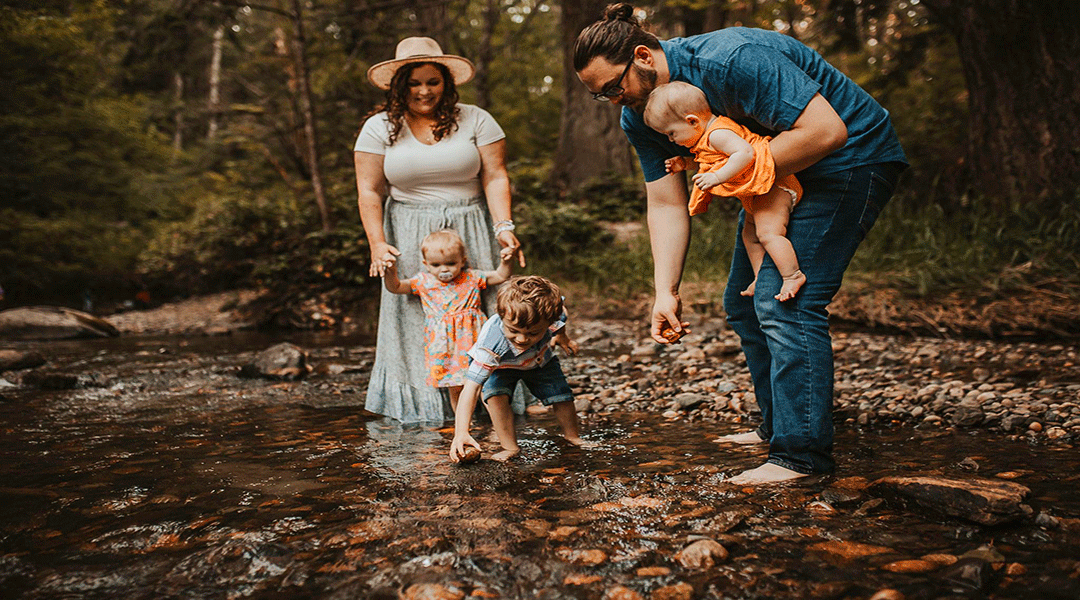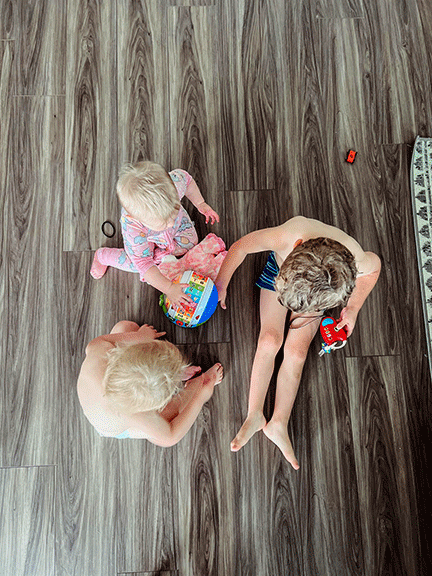Experts emphasize the most important thing a mom can do for her mental health is to go outdoors. (Photo provided by Lauren Cupp)
As a single mom, Gina Kirkland faced challenges in raising three children. Now, she’s at her wit’s end in the aftermath of the pandemic. She has lost her community.
“Going out in public, nobody wants to come (near anyone else),” Kirkland said. “Everybody wants to have this space — restaurants and stuff, put up partitions.”
Kirkland felt isolated, like so many others, during the pandemic. But like many others in the Midlands, she also felt the weight of being responsible for three children.
So she searched for community on Facebook.
“That’s been one of the key ways to really make friends,” Kirkland said. Or least try.
Kirkland isn’t alone. Local moms say they continue to struggle with feelings of loneliness, worthlessness and shame even as the pandemic ends. Many have turned to online “mom” groups, with mixed success.
Lauren Cupp and her husband just moved to Columbia from Washington State at the end of July. Because of the spread of COVID-19, mom-and-baby classes had been canceled. Cupp had relied on taking her three children to those to make friends with the other moms.
“I did have a close group of mom friends that I made when my son was born, because all their kids were born around the same time,” Cupp said. “And I would say with the pandemic, our group almost completely fell apart.”
Cupp, like Kirkland, has turned to groups for moms on Facebook and other networking groups for community. But these social media-based groups come with their challenges–many of them emotional.
Pam Litchford, a therapist and owner of Pam Litchford Counseling in Columbia, said she has seen an increase in patients dealing with loneliness and frustration.
“I am at capacity and have not been open for new clients in quite a while, and I hear the same from other counselors,” Litchford said.
Ladonna Lynch, a stay-at-home mom, tried to start two mom groups, but she said they didn’t gain any traction.
“It’s just tough,” Lynch said. “People would be interested at first, and then they might show up once, and then it would kind of die off. Or they would say they’re interested and then not show up at all.”
Cupp says going out in public feels “impossible” these days.
“I guess I don’t have the mental energy to go out and face the world,” Cupp said. “Being around other people just seems so much harder — and then managing kids on top of that.”
The struggle these moms face is the same struggle many people have with social media — it connects, but it can’t replace physical contact.
Sarah Adeyinka-Skold, an assistant professor in sociology at Furman University, recognizes social media builds a bridge to meet the needs of stay-at-home moms and working moms.
“I think it’s increasingly difficult for people to meet other people just spontaneously, so that’s where social media can come in,” Adeyinka-Skold said.
Kelly Horwood, a psychotherapist and owner of “This Full Life Counseling,” recognizes the benefits of social media but points out that it cannot replace physical interaction.
“I wouldn’t say it is an adequate substitute,” Horwood said, speaking over her child crying in the background. “No. But I think it can be a supplement.”
Litchford agrees. Humans are made for connection. A lack of it is harmful. “The feeling of isolation can be overwhelming,” she said over email.
Horwood said loneliness often snowballs into more isolation, harming mom and child further.
“If the mom is running on empty, the baby is not going to be able to get its needs met in ways that could be most effective,” Horwood said. “That’s not to say the mom was neglectful at all. But you can’t pour from an empty bucket.”
A study from Harvard’s Graduate School of Education, completed in October 2020, found that 36% of all Americans – including 61% of young adults and 51% of mothers with young children – struggled with loneliness as a result of COVID isolation.
Moms face burnout often because society doesn’t provide a safety net for families, said Jaclyn Wong, a sociology professor at the University of South Carolina.
“I think that some of the new research that is coming out on stay-at-home moms during the pandemic is showing just an extreme level of burnout and demoralization,” Wong said.
In addition to the sense of isolation, stay-at-home moms can face negative comparisons to moms who work outside the home, Litchford said. Shame is then added to the feelings of isolation, when moms feel inadequate.
“Shame usually grows in isolation and loneliness,” Horwood said.
Self-medication often follows, she said.
Litchford encourages moms to avoid the “Mommy Needs Wine” trap because it depletes mothers’ bodies and minds.
“Get some sun on your skin and put your toes in the grass,” Litchford said. “Walk every day. Eat enough protein, fat and carbs.”
Horwood tells moms to get out of the house from time to time.
“When your brain is used to the same location or same environment, it starts to get into these ruts,” Horwood said. “We need to shake our brains up a little bit and give them opportunities to get out of their normal routine.”
Kirkland, the single mom, has tried socializing. But her efforts often come up empty. She began seeing a counselor for the first time in her life during the pandemic. She said she was nervous originally, but it’s been helpful.
“It actually was really great,” Kirkland said. “It kind of helps you organize your thoughts, and it just really, I mean — you’d be surprised — just talk with him for 10 minutes, and you just feel a million times better.”
Lynch also said she is finding some success connecting. She and her kids happened to be playing at a park one day when a mom’s group was there. A woman from the group approached her and asked if she was new to their group because she didn’t recognize her.
“I joined up with them, and I’ve really loved it,” Lynch said. “It’s made a big difference.”
Cupp hasn’t been as lucky but reminds herself that life will be better one day.
“The thing I keep going back to is like, no matter how hard it gets, you just have to keep trying,” Cupp said.




